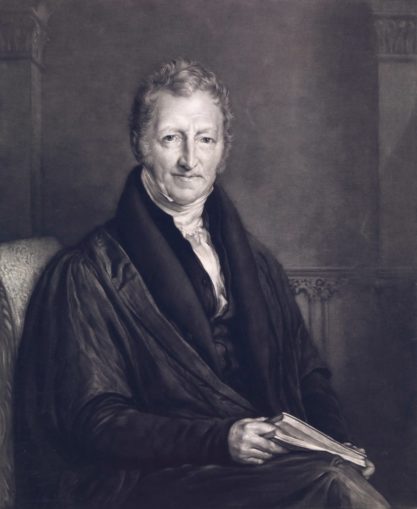
John Linnell, CC BY 4.0, via Wikimedia Commons
In 1798 Thomas Malthus postulated his gloomy theory that the growth in population must always outstrip the means of subsistence needed to support it: “Population, when unchecked, increases in a geometrical ratio. Subsistence increases only in an arithmetical ratio. A slight acquaintance with numbers will shew the immensity of the first power in comparison of the second.”
Malthus’ theory failed to take any account of the human instincts for adaptation and innovation, and it has been disproved countless times. However, it did succeed in giving the field of economics its nefarious nickname, the “dismal” science. Its reliance on a wayward piece of unprovable pseudo-logic opened the way for economic studies to become heavily politicised and opportunistic, and thus lose the objectivity that alone warrants classification as a science.
We may think of science as being objective, deterministic and governed by principles. But the descent of economic thinking into the realms of political argument render it inherently divisive. This is obvious when we see the obfuscation and muddled thinking that plagues contemporary debate on such issues as trade protectionism, the environment, energy policy, role of the state, welfarism, development aid, immigration, currency debasement, the looming cost-of-living crisis, the widening gap between rich and poor, confused responses to Covid and, of course, Brexit. These are just a few of the arguments that now generate far more heat than light, both in and out of Parliament.
Use of statistical “proof”
Resolution of such emotionally charged issues has been rendered virtually impossible by the selective use of statistics masquerading as scientific evidence – “proving” that, for example, decarbonisation should be pursued regardless of criteria such as affordability, reliability and technical feasibility, from which we are only a stone’s throw from “proving” that capitalism is to blame for climate change. Further, how can one sift the propaganda from the exercise of scientific reasoning when advocates of any plausible-sounding scientific approach turn out to be conflicted by undisclosed commercial interests?
Behold for a moment the calibre of weasels that now parade as legislators – not just here, but in the USA, Canada, the European Union, anywhere you care to look. Once politicians believe their own rhetoric they have reached the point of no return, in the process turning basic economics on its head. By, for example, lashing out billions to undeveloped countries in accordance with political “feel-good” criteria, we nurture and eventually perpetuate the same entitlement disease in recipient countries – countries that, in large part, have no market-driven entrepreneurial culture, no democratic institutions and whose corrupt, predatory and tyrannical rulers are the chief beneficiaries of all that “aid” – just as their forebears enriched themselves by selling their subjects into slavery, a fact invariably overlooked in today’s historic blame-game.
Work is the link between needs and their satisfaction
The economic health of a nation is affected by its mental state. Tragically, ours has become irremediably wedded to the political fiction of cradle-to-grave entitlement. This is the message pumped out on a daily basis by so-called Conservative politicians, for whom the most fundamental principle in economics – that of working for a living – has become a largely forgotten relic.
When living off the state is inculcated as an entitlement, it severs the thread that links citizens’ needs with their satisfaction. At the core of this malaise is the acceptance of an entitlement to consume the production and wealth of others: someone, after all, must have produced the food, clothes and other accoutrements of life in the body. A massive transfer of wealth must implicitly be taking place – whether or not acknowledged as such.
Note that the “state” is not that someone. The state, as such, can no more satisfy your day-to-day economic requirements than it can trade or act in any coherent, intelligible manner. The tax system is conventionally regarded as the wealth-equalisation agency, but in this time of hyperinflation, when the state is the chief victim of its own misguided policies, sums raised in taxes are insufficient to meet the demands of structured dependency, and recourse to borrowing is unavoidable.
Ironically, there is little difference between taxing and borrowing when (i) the former is indiscriminate and lacks any reference to sense or principle; and (ii) public borrowing is secured on, say, 10-year Treasury Bonds that will be refinanced or redeemed, if at all, in money with precious little purchasing power. They are equally guilty of robbing the population.
Leadership blindness is not “transitory”
One has to marvel at the sheer dumbness of incumbents in Threadneedle Street and Downing Street who last year proclaimed that inflationary pressures they had spent a decade stoking up were merely “transitory”. Instead of registering that their policy of suppressing interest rates while flooding the economy with counterfeit money was bound to usher in a wave – no, a tsunami – of inflation, they persisted with it anyway. Their narrative was standard piffle: since inflation was “externally” generated by temporary supply chain disruption, allowing interest rates to rise would damage demand – the ever-invoked Keynesian demigod. They couldn’t see what was staring them in the face: that Covid-driven state-funded largesse had created boundless pent-up demand, just waiting to explode when the lockdowns ended.
But no, they opined, the hike in inflation was “transitory” and would soon recede to its targeted rate of around 2 per cent annually. Yet, just as occurred in 2009, their posturing was shown to be just plain wrong. The tragedy is therefore that they will do it again. For them, their failed methodology is the only game in town.
We have been shown, yet again, that the Bank of England’s supposed mantle of independence is the merest negligee – scarcely hiding its actual role as arm of fiscal policy, dutifully buying up the debt representing the finance costs of government’s Covid largesse – showing how readily “imported” inflation morphs into the domestic variety.
The regulatory bandwagon
There’s more. Expansion of the state’s role feeds on itself and its sense of self-importance “rules the rule-book”. Every problem “requires fixing”, no matter how trivial.
Challenges to freedom of contract proliferate – government now controls hiring and firing procedures, holidays, sick pay, maternity pay, number of hours worked, minimum wages, parental leave, flexible working rights, auto-enrolment in private pensions. Is self-employment the answer? Changes in IR35 legislation and age discrimination laws that disincentivise hiring anyone over 50 – they all intervene to the ultimate detriment of firms, their employees and society.
Can you envisage anything more damaging to the real state than to permit the shadow-state to take over control of our fundamental freedoms?
© Emile Woolf April 2022 (website)



